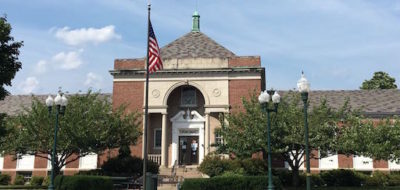INTERNET SAFETY POLICY December 2017
Introduction
The East Haven Public Library, Inc. (Hagaman Memorial Library) establishes this Internet Safety Policy to: (a) prevent user access over its computer network to, or transmission of, inappropriate material via Internet, electronic mail, or other forms of direct electronic communications; (b) prevent unauthorized access and other unlawful online activity; (c) prevent unauthorized online disclosure, use, or dissemination of personal identification information of minors; and (d) comply with the Children’s Internet Protection Act [Pub. L. No. 106-554 and 47 USC 254(h)]. Key terms as defined in the Children’s Internet Protection Act are given at the end of this Policy.
Also, in conjunction with this Internet Safety Policy, is the Library’s Internet Use Policy, which is referred to in this policy, and which is to be consulted as an applicable policy in setting enforceable parameters for the use of the Internet network at the Library.
Access to Inappropriate Material
To the extent practical, technology protection measures (or “Internet filters”) shall be used to block or filter Internet, or other forms of electronic communications, access to inappropriate information, as required by the Children’s Internet Protection Act. Blocking shall be applied to visual depictions of material deemed obscene or child pornography, or to any material deemed harmful to minors.
Subject to staff supervision, technology protection measures may be disabled for adults or, in the case of minors, minimized only for bona fide research or other lawful purposes. Procedures for the disabling or otherwise modifying any technology protection measures shall be the responsibility of the Library Director and designated library staff.
No internet filter is 100% effective and as stated in the Library’s Internet Use Policy, “…restriction of a child’s access to the Internet is the responsibility of the parents or legal guardians. The library staff cannot and does not act in loco parentis.” For more information on children and the Internet go online to OnGuardOnline, https://www.consumer.ftc.gov/features/feature-0038-onguardonline.
Inappropriate Network Usage
To the extent practical, steps shall be taken to promote the safety and security of users of the East Haven Public Library, Inc. online computer network when using electronic mail, chat rooms, instant messaging, and other forms of direct electronic communications. Specifically, as required by the Children’s Internet Protection Act, prevention of inappropriate network usage includes: (a) unauthorized access, including so-called ‘hacking,’ and other unlawful activities; and (b) unauthorized disclosure, use, and dissemination of personal identification information regarding minors.
Supervision
Internet access in the library available on its computers is subject to supervision as stated in the Library’s Internet Use Policy.
Adoption
This Internet Safety Policy was adopted by the East Haven Public Library, Inc. Board of Trustees at a public meeting, following normal public notice, on December 07, 2017.
Key Terms of the Children’s Internet Protection Act Defined
Key terms are as defined in the Children’s Internet Protection Act are as follows:
- The term “minor” means any individual who has not attained the age of 17 years.
- Technology Protection Measure. The term “technology protection measure” means a specific technology that blocks or filters Internet access to visual depictions that are: 1. Obscene, as that term is defined in section 1460 of title 18, United States Code; 2. Child Pornography, as that term is defined in section 2256 of title 18, United States Code; or 3. Harmful to minors.
- Harmful to Minors. The term “harmful to minors” means any picture, image, graphic image file, or other visual depiction that: 1. Taken as a whole and with respect to minors, appeals to a prurient interest in nudity, sex, or excretion; 2. Depicts, describes, or represents, in a patently offensive way with respect to what is suitable for minors, an actual or simulated sexual act or sexual contact, actual or simulated normal or perverted sexual acts, or a lewd exhibition of the genitals; and 3. Taken as a whole, lacks serious literary, artistic, political, or scientific value as to minors.
- Sexual Act; Sexual Contact. The terms “sexual act” and “sexual contact” have the meanings given such terms in section 2246 of title 18, United States Code.
